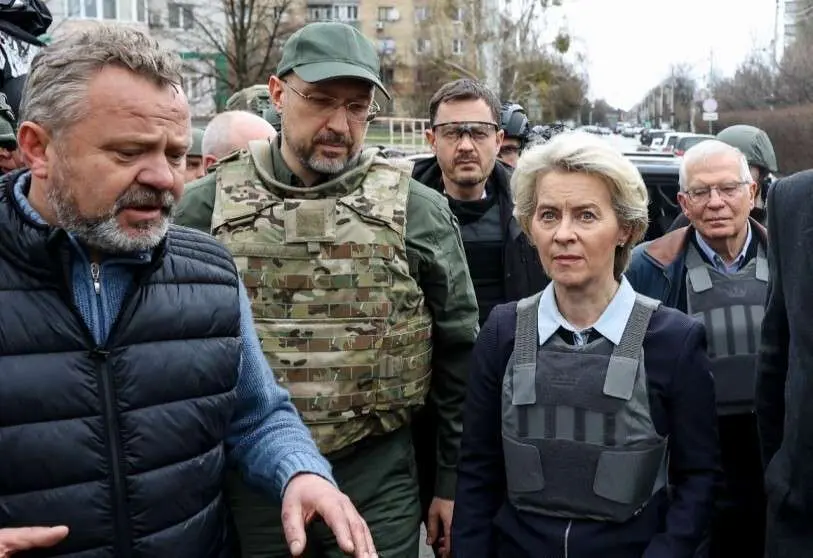Von der Leyen invites Ukraine to join the EU "within weeks" on visit to Kiev

The President of the European Commission and the High Representative for Foreign Affairs, Ursula von der Leyen and Josep Borrell, arrived in Kiev on Friday morning accompanied by the Prime Minister of Slovakia, Eduard Heger.
The European leaders were received by President Zelenski and Ukrainian Prime Minister Denys Shmyhal, one of President Zelenski's strongmen.
At the leaders' joint press conference with the media, Ursula von der Leyen offered Zelenski the necessary documents to complete his application for EU membership. "This is an important step towards the EU," said the Commission President, according to EFE sources.

Zelenski and von der Leyen agreed to make every effort to complete the necessary formalities, and the Commission President promised to respond to the application in a matter of weeks. Normally the EU accession process takes several years. "This is the beginning of your journey towards the EU," the Commission President added.
Von der Leyen and Borrell are the highest-ranking EU leaders to visit Ukraine. A few weeks earlier, the President of the European Parliament, Roberta Metsola, also visited Ukraine. Prior to that, the presidents of the so-called Visegrad group of countries also visited Kiev, even though the city was still under siege by Russian troops who left the area at the beginning of April following negotiations between Ukraine and Russia in Istanbul.
Президент України Володимир Зеленський розпочав зустріч із Президентом Європейської комісії @vonderleyen та Високим представником Європейського Союзу із закордонних справ та політики безпеки @JosepBorrellF, які прибули з візитом до нашої країни. pic.twitter.com/uYuqYuIzP6
— Офіс Президента (@APUkraine) April 8, 2022
The visit of the European leaders demonstrates once again the strong commitment of the European Union and the 27 Member States to the Ukrainian government and to the defence of its independence and sovereignty in the face of Putin's aggression last February. Specifically, Josep Borrell announced that new aid worth 500 million euros in military equipment will be given to Ukraine to help in the country's defence. This is in addition to previous aid, which already totals 1.5 billion euros for Ukraine from the European Union.
Slovakia's Eduard Heger also offered support to Kiev. He proposed logistical assistance for the transport of Ukrainian goods by train through Slovakia. The Slovakian nation is one of those that have so far helped Ukraine the most, especially in the humanitarian field, along with Poland and Hungary.

The EU also announced new sanctions against Russia earlier this week. Following the uncovering of the Bucha crimes committed by the Russian military, the EU-27 sanctioned Putin and the Russian economy with the fifth package of sanctions. Russian gas is not yet subject to sanctions because of the "impossibility" of the EU not being dependent on it in the short term, although this is the ultimate intention, as Clément Beaune, the French Secretary of State for the European Union, explained in an interview with Radio France Internationale on Tuesday morning.
The fifth European sanctions package does target Russian coal imports, the sale of advanced technological equipment and military exports.
On their trip the European leaders also went to the town of Bucha. Journalists and photographers were able to witness the Commission President and the High Representative looking at a mass grave with civilian corpses wrapped in plastic bags. They were then guided to the local church, to light some candles and see the bell damaged during the fighting in Bucha.

According to information from Antonio Pita, special correspondent for El País, the European delegation travelled under heavy security measures. The photographs show a large number of armed agents. Pita also reports that the meeting with Zelenski in the afternoon was held in a secret location, and that the journalists were called to the press conference at the last minute.
The morning was also marked by the Iskander missile attack on the railway station in the eastern Ukrainian town of Kramatorsk. The missile strike damaged the railway station and left at least 30 people dead and several injured. Until now, the train stations have been spared Russian attacks and shelling. Von der Leyen and Borrell have strongly condemned the attack on the social network Twitter.








